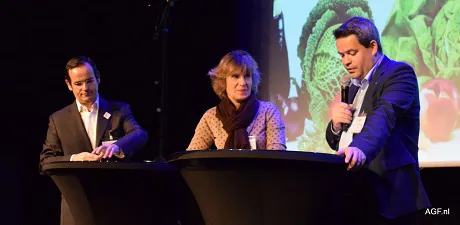"Using subsidies to increase production is not the way to go," says Philippe Appeltans of BelOrta. He was addressing delegates at ICOP 2018. This is the European Producers' Organizations (PO's) annual congress. Environmental organizations are putting increasing pressure on growers to be (more) sustainable. And sales organizations want (year-round) availability and quality at the lowest possible price.

A forum discussion with Annette Kliemann and Philippe Appeltans
Copa-Cogeca/BelOrta uses European agricultural subsidies for innovation and branding. It is also using this money for the development of a knowledge center. "Producer organizations are central to the foodstuffs chain. They need to behave in the manner of an economic organization. It is important that growers follow the market and not the other way round," says Philippe. It is difficult to determine what POs spend their European subsidies on. A worldwide analysis shows that about 30% of these subsidies go toward fixed assets, while 1% is spent on innovation.
In Europe, work is being done on a new common agricultural policy. Philippe Appeltans is reasonably positive about the direction this new policy is taking. The unequal trade relationships are also getting attention.
Philippe Appeltans, Copa-Cogeca/BelOrta
The Dutch government recently made known their vision for the future for agriculture and horticulture. Cyclical agriculture is at the core of this policy. Marjolein Sonnema gave a presentation about this. She is the Director General of the Ministry of Agriculture, Nature and Food Quality.
Firstly, she looked back at the past 50 years. During this time, the Dutch policy was primarily aimed at the efficient production of as many types of food possible. This, at a low price and with a reasonable income for the farmer. The Netherlands has developed into one of the most important export nations in the world. However, the government is now changing course.
"We will not get any further if we continue on this linear road," says Sonnema. The Netherlands wants to produce foods more in balance with nature. They want to do so by transitioning to cyclical agriculture and reusing resources. This change in thinking is a big change for the horticultural sector. "Producer organizations are open to this. It will ask a lot of them, but most are motivated and deserve our sympathy", says Sonnema.
Marjolein Sonnema, Director-General of the Dutch Ministry of Agriculture, Nature, and Food Quality
Dr. Annette Kliemann, an EU legal officer, outlined the framework of the new legislation for PO's. These are meant to strengthen growers' positions and stimulate mutual cooperation. On the other hand, Europe is taking a critical look at the forming of cartels. This is why this legislation has clear guidelines concerning price agreements.
The added-value of cooperation with PO's is not a given in all European countries. The level of organization also differs from country to country. Countries in Eastern Europe have been trading on the free market for less than 30 years.
Dr. Annette Kliemann
